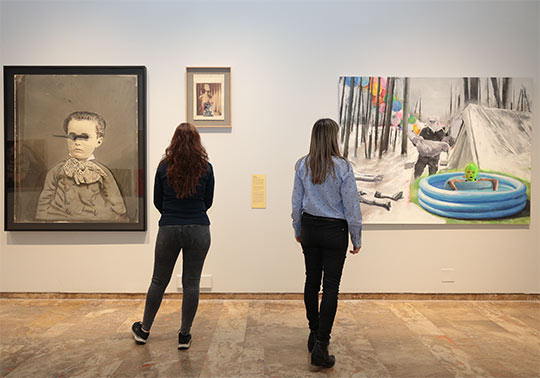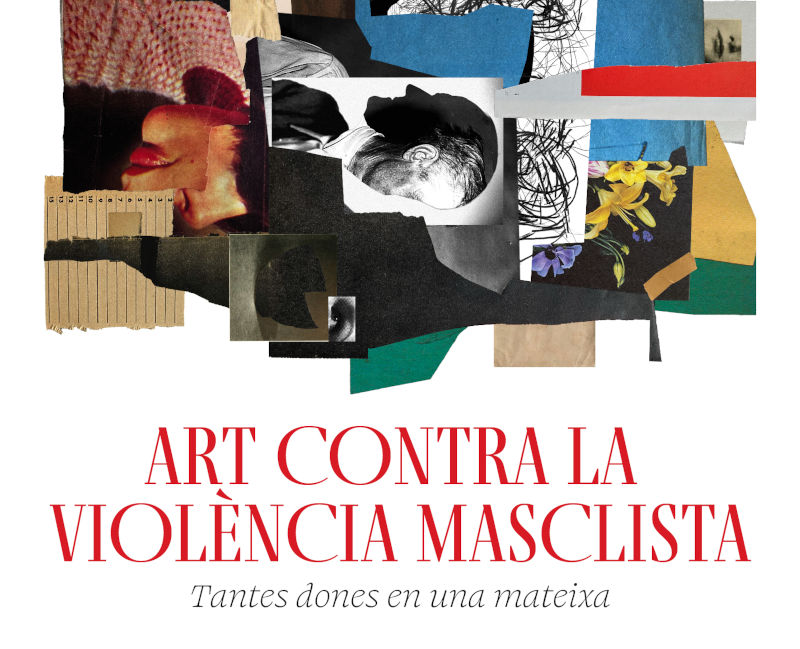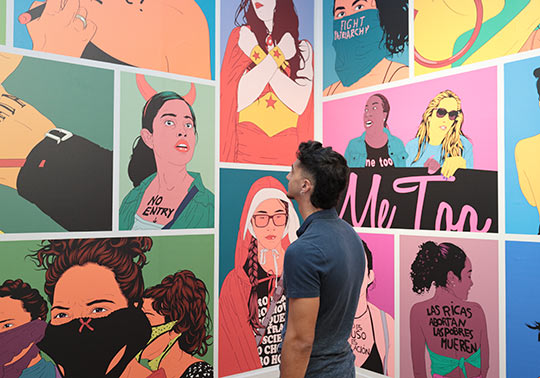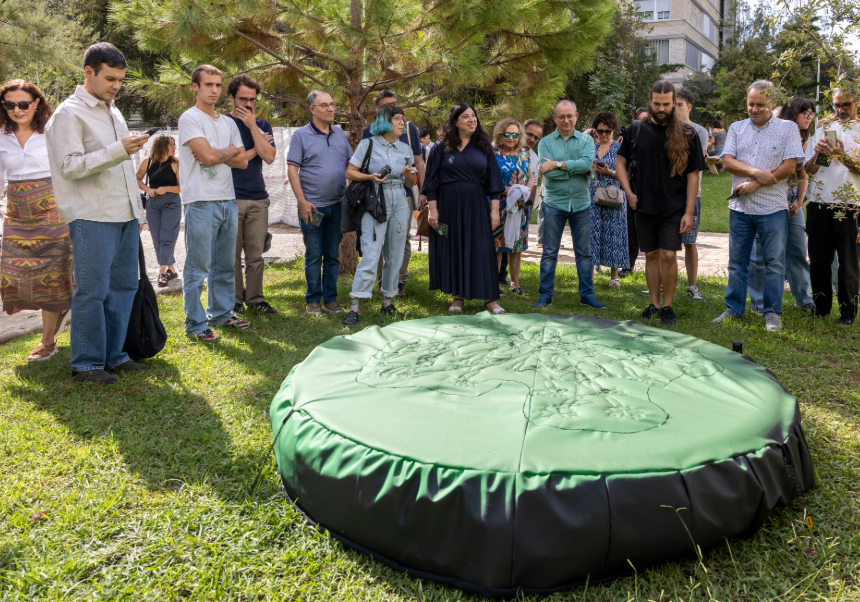The UV showcases the work of 31 artists against gender-based violence at La Nau
- University Culture Service
- November 30th, 2023

From 30 November to 24 February 2024, the Universitat de València hosts the exhibit titled “Art against gender-based violence: So many women in one and the same” in the La Nau Cultural Centre. This exhibit showcases the artworks of thirty-one female artists that use their art to speak out against gender-based violence and stand up for the freedom of women who have suffered abuse and sexism.
To celebrate International Day for the Elimination of Violence against women, on 25 November, this exhibition, curated by the Universitat de València, is made up of a wide selection of artworks from the heritage collections of the Valencian public universities: University of Alacant, Miguel Hernández University, Universitat Jaume I, Universitat Politècnica de València and the Universitat de València, as well as different private collections (Pilar Citoler, Inelcom, DKV...).
Curated by Semíramis González, the exhibition in the Academy Hall and the Estudi General Hall brings together the artworks of 31 artists: Concha Jerez, Estefanía Martín Sáenz, Sandra Gamarra, Alessandra Spranzi, Isabel Oliver, Nuria Rodríguez, Julia Galán, Maribel Domènech, Carmen Calvo, Doris Salcedo, María Carbonell, Gabriela Bettini, Núria Güell, Ana Teresa Ortega Aznar, Mª Jesús González / Patricia Gómez, Sanja Iveković, Mavi Escamilla, Sophie Calle, Ángela García Codoñer, Maruja Mallo, Ingrid Lozano, Soledad Marina, Vargas Isabel Villar, Marina Núñez, Hanna Jarzabek, María María Acha-Kutscher, Úrsula Ochoa and Päivi Koskinen. The exhibition boasts a wide variety of techniques from photography to painting to collages, all created to demand, through art, an egalitarian society that protects women.
The exhibition was announced at a press conference on Thursday 30 November in the Estudi General Hall of the La Nau Cultural Centre, in which Vice-principal for Culture and Society Ester Alba, the curator of the exhibition, Semíramis González, and artist María María Acha-Kutscher spoke about the exhibition, who’s title hails from a verse of the poem “Criatura múltiple” from the Valencian poet María Beneyto. The artworks are divided into four thematic spheres that address violence against women from different perspectives.

Poster of the exhibition created by Patricia Bolinches.
The vice-principal Ester Alba stressed that one of the most important achievements of this exhibition was bringing together funds from the five public Valencian universities in order to send a message through art against gender-based violence, “a pandemic to which we must seek a social and political solution” and to which the universities cannot turn a blind eye. The vice-principal also requested a minute of silence to honour the latest victim of gender-based violence in Sagunto, where a women was murdered as her 13-year-old daughter escaped through a window.
In the words of curator Semíramis González, “There exists no better space than the university to host an exhibition that seeks to protect us women, who are not merely a collective, but make up half of the human population. It is a question of social responsibility and democracy. That is why institutions of education and the school of thought, such as the university, are fundamental to progressing towards a more egalitarian society.”
The exhibition starts in the Estudi General Hall with the sections “Ending gender-based violence” and “Women are not weapons of war”. It then continues into the Academy Hall with the sections “Against sexist stereotypes” and “Resilience and survival”. Simultaneously, the Senate Hall and the Oberta Hall are showcasing the installation titled “Indignadas. María María Acha-Kutscher”, which acts as a continuation of the message of the exhibition with an extensive selection of digital illustrations that portray feminist activism.
In the very first space of the exhibition, “Ending gender-based violence”, you will find pieces that either aim to give visibility to different facets of gender-based violence or pieces that condemn gender violence in all its forms. The works address gender violence in a broad manner, often quite subtly, and contend with various topics, such as the spaces that harbour violence, media and the press, social norms that demonise women, or the physical traces left by gender violence. Artworks from the following artists are displayed: Concha Jerez, Estefanía Martín Sáenz, Sandra Gamarra, Alessandra Spranzi, Isabel Oliver, Nuria Rodríguez, Julia Galán and Maribel Domènech.
The next section, “Women are not weapons of war”, draws the viewers’ attention to a violence suffered by women that is often silenced by the very context in which it occurs--armed conflicts. Beyond the violence suffered by all, women suffer an additional violence, specific to their gender: forced sterilisation, abortions, sexual violence, etc. This thematic area aims to give the role of gender in armed conflicts and war the visibility it deserves and raise awareness on how women and girls are disproportionately affected in these circumstances through the works produced by Carmen Calvo, Doris Salcedo, María Carbonell, Gabriela Bettini, Núria Güell, Ana Teresa Ortega Aznar, and Mª Jesús González / Patricia Gómez.
In the Academy Hall, the section “Against sexist stereotypes” showcases diverse works from Sanja Iveković, Mavi Escamilla, Sophie Calle, Ángela García Codoñer, Maruja Mallo, and Ingrid Lozano that speak out about the importance of recognising sexist stereotypes in the visual world. Through the years fashion, films, advertising and art have fabricated an unrealistic model of women and girls in society, one that is often linked to either a traditionally domestic image or a hyper-sexualised, objectifying one. For this reason, the pieces included in this section admonish these sexual stereotypes in visual media and argue the importance of challenging them in order to imagine a more realistic and egalitarian view of women in society.
In contrast to the three previous thematic spheres, which all aim to raise awareness with regard to the multiple forms of violence against women (gender-based violence, sexism and visual stereotypes), the last space is dedicated to female resilience and survival as its title suggests. “Resilience and survival” is a space for recovery, to reclaim the path of overcoming violence to create a fairer, kinder future for women. In this section, the artworks produced by Soledad Marina, Vargas Isabel Villar, Marina Núñez, Hanna Jarzabek, María María Acha-Kutscher, Úrsula Ochoa and Päivi Koskinen speak to us about the different ways of healing and overcoming gender-based violence. The exhibition leaves the public with the message that we, as women, can both survive and thrive.
In addition, and within the framework of this exhibition project, the Senate Hall and the Oberta Hall host “Indignadas. María María Acha-Kutscher”. The work of this Lima-born Spanish artist focuses particularly on women--their history, their fight for emancipation and equality, and the cultural construction of femininity. Her work fulfils a dual function as both an artistic product and as an instrument in the fight for woman’s demands.

A man contemplates the installation of María María Acha-Kutscher.
The work of this artist is also shown in the last of the sections of the exhibition titled “Resilience and survival”, but in this space her work extends even further through her large-scale illustrations, which are based on photographs from the print and alternative media, and act as a testimony of both the female struggle and women’s fundamental role in social movements.
The installation in the second hall shows a extensive collection of drawings which the artist has produced during the last 10 years, focused exclusively on movements against gender-based violence around the world. The goal is to promote grassroots feminist collectives and movements that are not only fighting for our rights, but also our lives.
CRIATURAS MÚLTIPLES: MEDIATION PROGRAMME
In the framework of the exhibitions “Art against gender-based violence. So many women in one and the same” and “Indignadas. María María Acha-Kutscher”, a series of activities have been programmed to build experiences within the spaces of the cultural centre. The purpose of these activities is to open the door to knowledge and meaning through communicative processes in dialogue with other artistic methodologies and practices.
The mediation programme offers a multitude of perspectives from which to read and activate the pieces: through words with a recital by the poet Elsa Moreno, through dance and movement with Paula Pachón, through performance with Blanca Matías, and through cinema with an activity in collaboration with the Faculty of History of the Universitat de València. Cultural communicator, author, LGBTQ+ and feminist activist Eugenia Tenembaum will also be participating in the programme with a conference titled “The history of art through a feminist perspective”, presented by Semíramis González.
Criaturas múltimples includes guided visits for the general public and school groups in which the mediation team accompanies the groups during the visit to activate reflection, action and experimentation through the artworks that make up the exhibitions.
The guided visits for the general public further the idea that there are multiple ways to visit the exhibitions, with paths that address different possible readings, and attempt to construct the experience of the visit together with the attendees. The school visits are designed for groups of students in Secondary School, Bachillerato and Vocational Training Cycles accompanied by the staff of their educational centres. The groups will discuss identity and diversity, gender-based violence, women and safety, building gender identity online, and more.
For more information regarding the calendar of events and the guided tours, please visit UVCultura
The school group visits and those arranged for large groups can be requested through voluntariat.cultural@uv.es and by telephone: 96353107
More information:
Categories: Cultura , Centre Cultural La Nau , Exposicions
















